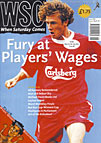 The rise in players' wages continues to grow at an alarming rate, causing Deloitte and Touche to call for clubs to show a harder stance during negotiations
The rise in players' wages continues to grow at an alarming rate, causing Deloitte and Touche to call for clubs to show a harder stance during negotiations
The strangest publication to arrive at WSC for a long time was a glossy brochure called, with no apparent sense of irony, UEFA Champions League: A solidarity system for European football. Published in February this year, it appears to form part of UEFA’s campaign to head off any attempt to challenge the central marketing of TV rights to the Champions League.
At about the same time the latest bunch of facts and figures from those stern realists at Deloitte & Touche thudded onto our doormat. This was their overview of the Premier League in 1998 which received considerable publicity thanks to the revelation that players’ wages had undergone another phenomenal increase, by as much as 81 per cent at Chelsea, for example.
The two documents neatly sum up the opposing concerns of the clubs and federations whose business is Big Football. UEFA’s production is full of ringing, Soviet-style declarations which mean almost the exact opposite of what they say, such as: “The redistribution of revenue from the UEFA Champions League serves to maintain a sporting and financial balance between the leading clubs from the large and small European countries.”
Their rhetoric is spot-on (“true competition is about… the chance for the weak as well as the strong to follow their dreams”) but it masks a desperate and disingenuous bid to package their surrender to the big clubs as something more honourable.
Deloitte & Touche, as ever, are extremely concerned about wages in their chummy kind of way. Back in 1995 they wrote in their annual report: “We believe controlling the wage bill is, long-term, football’s greatest challenge!” Not much has happened to alter their opinion since (although, in the way football is run as a business, an awful lot has changed).
“The wage increases paid to ‘Stars’ will continue,” they write now. “That is a dynamic which clubs will have to manage, as smartly as they can, within their overall business structure. But the economics will improve if greater toughness is shown in negotiations with first team and squad players… Can we have some more, hard-headed, realism please?”
We could, but it wouldn’t make anyone very happy except accountants and club chairmen. The only time fans worry particularly about the finances of their club is when it is on the verge of extinction. Deloitte & Touche have often pointed out, reasonably enough, that the financial problems of small clubs have been exacerbated by rising wages and declining transfer income. Yet the main causes of the direst crises that have threatened the likes of Portsmouth, Crystal Palace, Oxford, Luton, Brighton, Doncaster and Chester in recent years have been either rank incompetence (and worse) in the boardroom or problems associated with the club’s ground in the post-Taylor era.
For those not fixated by the bright lights of Big Football, this season has been full of small triumphs. In their different ways, clubs such as Crewe, Stockport, Walsall, Bournemouth, Hull and Doncaster (not to mention Blackburn) have proved that there is nothing inexorable about football’s economic laws. The depressing mantra that league position is determined by the size of the wage bill is not uniformly true.
What would make it even less of a factor would be some commitment to match UEFA’s egalitarian rhetoric from national and international governing bodies. (Not that you would ever hear even talk of the weak following their dreams from the likes of the FA or the Premier League.)
One thing smaller clubs need is indeed a dose of Deloitte & Touche’s hard-headedness – but not only in relation to the wages bill. Rather, it should be directed at the kind of people who take a reasonable healthy Premiership club and drive it into acute financial crisis within less than 12 months. In Germany, all clubs have to comply with certain financial criteria each season before they are granted a licence by the FA. It’s no idle threat – St Pauli are the latest club in danger of losing their place in the league, and many others have gone before them.
It is not a perfect system by any means, but it would be one idea worth pursuing. That is, if we had in this country a governing body with the interests of the whole game at heart and which ran the entire professional league, rather than one tied to the 20 biggest clubs’ purse strings.
From WSC 148 June 1999. What was happening this month